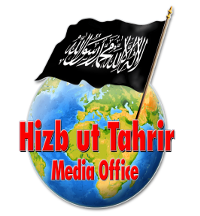Media Office
Kyrgyzstan
| H. 14 Safar 1445 | No: 1445 / 01 |
| M. Wednesday, 30 August 2023 |
Press Release
Remarks on Kyrgyzstan's "Independence" Day
(Translated)
August 31st is celebrated as Kyrgyzstan's Independence Day since 1991. So, is Kyrgyzstan truly an independent state? We seek to answer this question by examining the historical facts and terminology.
Firstly, let us delve into the history of independence in the 20th century in relation to this matter. The term "independence," after World War II, came to signify liberation from colonialism. In reality, this is its superficial meaning only. The truth is that the owner of this matter is the America, which invented it to create an opportunity to strip the colonies from other colonizers. The Atlantic Charter is the first step in this process.
The Atlantic Charter is one of the key programmatic documents of the anti-Hitler alliance, which was accepted by the British Prime Minister and the American President at the Atlantic Conference and announced on August 14, 1941. On September 24, the Soviet Union joined it. This Charter was issued to define the world order after the victory of the Allies in World War II. However, in reality, the America had not entered the war at that time. Later, the term "United Nations" was also used as a synonym for the anti-Hitler alliance, and this later became the basis for the United Nations organization.
In this conference, America demanded access to the colonies of other countries in exchange for its entry into the war on the side of the Allies. It is officially defined in the Charter's articles, some of which are as follows:
- The restoration of sovereignty and self-government rights to the peoples that were forcibly deprived of them. This means creating an opportunity for the America to incite colonized countries against the old colonial powers under the banner of independence and recolonizing them.
- The free participation of all countries in global trade and access to the necessary raw materials for state development. This means opening the door to the acquisition of raw materials for countries that were colonized by other colonial powers, referred to as trade.
- Global economic cooperation. This means the entry of colonies under the control of other colonial powers through economic colonialism.
The implementation of these articles in the Charter began after the war. These operations are known as decolonization (the process of declaring independence and full sovereignty in territories and dominant and mandated colonies). It can be said that the process of decolonization began with India gaining independence in 1947. However, in reality, when the America started inciting independence revolutions in this country, Britain granted fake independence to India and Pakistan, keeping them under its control. Similar instances occurred in countries that later gained independence. The conflict between the America and Britain continues in India to this day. The Indian People's Party (Bharatiya Janata), the ruling party there, is an agent of the America, and the Indian National Congress Party is an agent of Britain. The America has completely taken over Pakistan. Decolonization processes primarily took place in Asian countries until the 1960s.
Decolonization received strong support from the United Nations in the 1960s. In the same year, the United Nations accepted the declaration "granting independence to countries and peoples under colonialism." In 1961, President Kennedy of the America and Premier Khrushchev of the Soviet Union agreed in Vienna to divide the colonies between them. Afterward, efforts to achieve independence intensified, especially in Africa.
As previously mentioned, the America and the Soviet Union paved the way for the entry of British, French, and other smaller colonial countries through independence struggles. Former colonizers tried to maintain their influence in their colonies and prevent new colonizers from entering. For example, Britain tried to retain the countries in its colonies through the Commonwealth of Nations organization. The America has partially penetrated some countries in this organization, while withdrawing from others completely. France worked through the Francophonie organization. This is how the colonial conflicts of these colonizers were resolved through political, economic, military, and cultural agreements. This aspect was referred to as the "new colonialism." The countries that became victims of it were called developing countries or third world countries.
Afterward, the war known as the Cold War or the non-violent war between the America and its competitor, the Soviet Union, began. The Soviet Union was defeated in this war and collapsed. The allied countries within the Soviet Union gained fake independence. Russia established the Commonwealth of Independent States (CIS) to maintain its colonies. However, it couldn't retain full control over its colonies, and its influence started to weaken. Subsequently, it formed the Collective Security Treaty Organization (CSTO) from a military perspective and the Eurasian Economic Union (EAEU) from an economic perspective. Its influence further diminished as the countries under its former colonial rule became members of other international organizations, opening up avenues for other colonizers to enter.
Kyrgyzstan, like other countries in Central Asia, obtained fake independence and has now become a target for new colonization campaigns. Despite Russia's previous colonial dominance in Kyrgyzstan, the America continued to intervene in our internal affairs. China, which has started its new colonization by seizing the Osh region, has become the primary lender and investor in Kyrgyzstan, intensifying its economic expansion.
Therefore, August 31st is not the day of independence for the people of Kyrgyzstan; rather, it is the day of a new colonization.
We call upon the people of Kyrgyzstan to remember the information mentioned above: We are Muslims, and the only way to rid ourselves of colonization is through Islam alone. So, let's all learn our Islam together and hasten to implement it.
Media Office of Hizb ut Tahrir
in Kyrgyzstan
| Hizb-ut Tahrir: Media office Kyrgyzstan |
Address & Website Tel: http://hizb-turkiston.net |
E-Mail: webmaster@hizb-turkiston.net |





